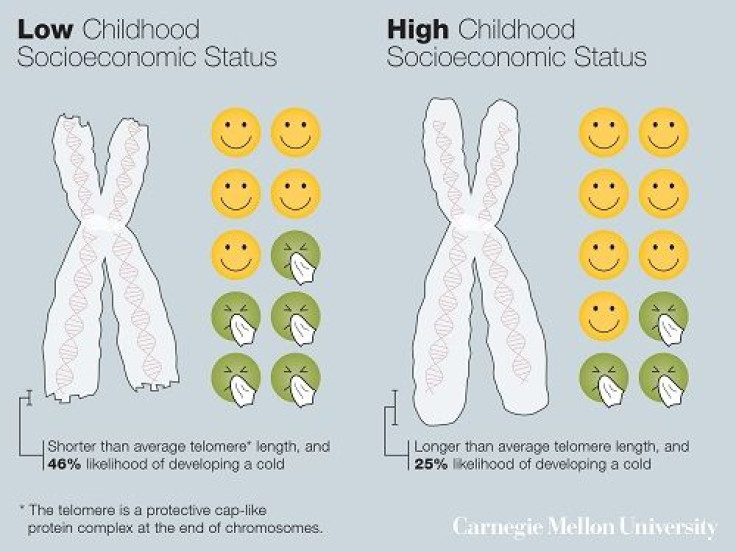Poor Children More Susceptible To Catching Colds As Adults: How Childhood Environments Impact Adult Health

More than 16 million children in the United States, which is 22 percent of all children, are born into families whose incomes are below the federal poverty line.
According to research, these children are more likely to suffer from mental health issues such as higher rates of suicide, cigarette smoking, and heavy drinking.
Now, researchers from Carnegie Mellon University find that there is an association between a child’s socioeconomic status and his or her susceptibility to colds and other infectious diseases in adulthood.
"This provides valuable insight into how our childhood environments can influence our adult health," said Sheldon Cohen, the Robert E. Doherty Professor of Psychology in CMU's Dietrich College of Humanities and Social Sciences.
The researchers found that, when the participants' childhood home was not owned, their telomere length during their adulthood was shorter. The telomere is a biomarker of aging; as people age, their telomeres shorten. Research from the University at Utah shows that shorter telomeres are associated with shorter lives. They might also be responsible for cancer, cardiovascular diseases, and the most recent discovery — infectious diseases, specifically upper respiratory infections.
A total of 152 healthy subjects, ages 18-55, were used in this experiment. They answered questions about their childhood and current socioeconomic status. The participants were then exposed to the rhinovirus, which causes the common cold, and quarantined for five days.
Participants who reported that their childhood home was only owned for a few years by their parents had a shorter than average telomere length, which subsequently decreased by five percent for each year that their parents did not own a home.
"We have found initial evidence for a biological explanation of the importance of childhood experiences on adult health," said Cohen, "The association we found in young and midlife adults suggests why those raised by parents of relatively low socioeconomic status may be at increased risk for disease throughout adulthood."
The researchers found that the youngest people, those ranging from ages 18-22, did not show any association between their telomere length and whether they got a cold or not. But once they got older, their telomere length started to predict whether they would develop an infection or a cold.
This research may be important for predicting the development of future risk factors for many diseases. But, "This is preliminary research and further work with other viruses and with natural infections will help clarify its implications," Cohen said.
Source: Cohen S. Childhood Socioeconomic Status, Telomere Length, and Susceptibility to Upper Respiratory Infection. Brain, Behavior and Immunity. 2013.



























